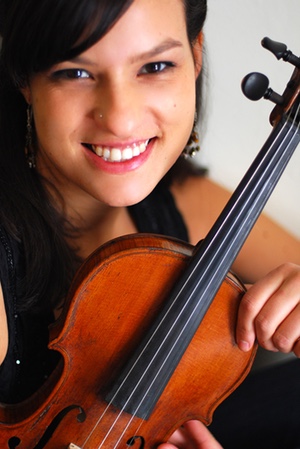Alumna fiddles while career burns bright
/By Paul Mayne, Western News
From creating and running her own website, social media and booking gigs, to acting as agent, promoter, musical director and performing, Celina Di Cecca is a hands-on CEO of her ‘mini corporation.’
“It is hard work some days. But I love it and wouldn’t want to do anything else,” said the Don Wright Faculty of Music alumna. “Music is my religion. It moves me; it’s very cathartic; it’s therapeutic to get you through good times and bad times. You always have music with you.”
And that’s true for Di Cecca who, at age 4 growing up in Hamilton, Ont., picked up her first violin.
“I was the youngest of three kids, so I was kind of the showoff of the siblings,” she said, adding her brother, mom and grandfather are musicians themselves. “It’s a big part of my family and just felt normal to me. I guess it’s in the blood. Every Christmas, or at family gatherings, we’d have our musical instruments out. And we still do to this day.”
After attending her first fiddle camp at age 12, and being exposed to the toe-tapping rhythms of fiddle music, she fell in love with Canadian Celtic music. Having wowed audiences now for more than 20 years performing both classical and fiddle music throughout Canada – including creating the Great Canadian Fiddle Show, the Greyhound Riders and her solo work – it wasn’t until Di Cecca came to Western that she knew music was her going to be her life.
“The music program at Western is well known and respected in Ontario and Canada and I had known some folks who had gone through the program,” said Di Cecca who, while in first year, put together a string quartet with some fellow students to play weddings and corporate gigs to help pay for her schooling.
“I was like, ‘Wow, I’m actually making a pretty good wage compared to your regular student job,’” said the 32-year-old. “I started to gig more, was building my confidence, putting groups together and playing at Scots Corner (in London). Although I always wanted to be a musician, I never knew being a musician was really a job.”
Along with teaching private lessons (fiddle, violin, viola, mandolin and piano), Di Cecca’s talents and stage performance makes her a highly sought after live and studio musician in Toronto. She has performed with such notable musicians as Kevin Hearn (Barenaked Ladies), Heather Rankin (The Rankin Family), Shane Cook, Mark Sullivan and Jake Charron (East Pointers).
Her most recent creation is producing, directing and performing in The Great Canadian Fiddle Show, which has played Canada’s Wonderland, the Canadian National Exhibition, the Grey Cup and countless tours over the last five years.
Di Cecca is also in a variety of bands including the Toronto based folk-roots duo Greyhound Riders, with her husband Tony Nesbitt-Larking, The Amores and has recently joined Toronto rock band Sirens of Shant. She’s also a founding member of Steel City Rovers and has performed with the Tartan Terrors.
It was during her time at Western where she first started to dabble in songwriting, having written dozens of songs over the years. With plans to record all of the music she wrote, Di Cecca recently released her debut single, Waiting.
While the life of a musician can be one filled with many lows and few highs, Di Cecca said she is “all in” when it comes to her music.
“I jumped in, set goals and, like my mom always taught me, I never took ‘no’ for an answer and dug my heels into the ground,” she said. “If you want something hard enough, you need to work for it. I’ve always done that. Being at Western, while the music program is challenging, at the same time, it builds your skills. Western really built my confidence as both a player and teacher. It has played a key role in my music career.”
Di Cecca will be bringing her Great Canadian Fiddle Show to London’s Aeolian Hall next March for a pair of shows and looks forward to sharing what she calls “a musical journey from coast to coast” of traditional Canadian fiddling.
“We show them (audience) fiddling is alive across the country; it’s not just an East Coast thing,” she said. “There are different dialects and accents across Canada, so too are there different styles when it comes to fiddling. It’s our traditional music and we want to keep it alive.
“It’s fulfilling putting smiles on so many faces, from little kids mesmerized by seeing the fiddle for the first time, to the seniors who know all about its history. It’s wonderful to share music with everyone.”
Reprinted with permission from Western News







